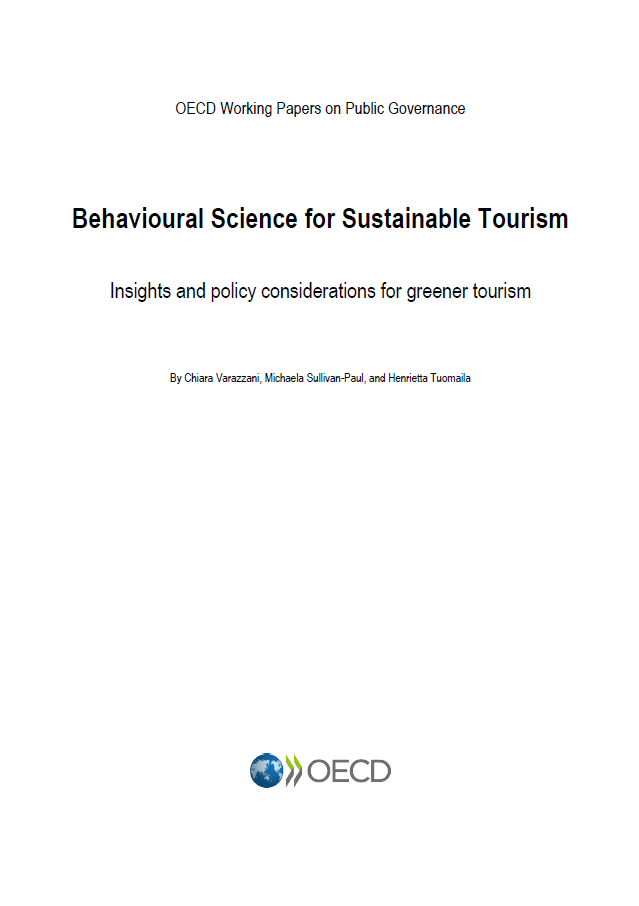Behavioural Science for Sustainable Tourism: Insights and policy considerations for greener tourism

Summary
Tourism and sustainability are two words not often seen in the same sentence. Yet, with rising climate mitigation and adaptation commitments set aside the severe impacts of the pandemic on the tourism industry, governments are working to develop new strategies that strike a balance. In many countries, tourism is an essential contributor to GDP, accounting for as much as 4.4% of GDP and 6.9% of employment in OECD countries prior to the COVID-19 pandemic. Yet, the development of recovery plans provides a moment to rethinking the tourism sector into one that pays credence to its environmental impact, addresses the threats of climate change and support a transition to more sustainable models of tourism development.
Behavioural science for more sustainable tourism
Applying behavioural science alongside traditional policy tools can provide valuable insights to enhance sustainability in the tourism industry. Cognitive biases and barriers play a significant role in tourism-related decision-making, including decisions on the choice of destination, activities, transportation, and length of stay. To better understand and address these cognitive barriers, behavioural science offers promising avenues to encourage sustainable decision-making among individuals and drive the transition towards eco-friendly tourism practices.
Pilot testing for fuel-efficient practices
Air travel and transportation remain one of the top global polluting sectors making it an obvious and critical target for eco-innovations. Virgin Atlantic’s Fuel Efficiency team ran randomised control trials (RCTs) on pilots to test the effects of behaviourally informed measures on enhancing the fuel efficiency of air travel. Behavioural interventions included personalised targets and reports outlining the impact of pilots’ flying habits in relation to environmental impact; social norms that compared the results between pilots’ flying history; and incentives whereby donations were made on the behalf of pilots who reached their targets to the charity of their choice. The results were signifcant, with participating pilots saving 21 million kilograms of CO2 and 6.8 million kilograms of fuel over an 8-month period, resulting in cost savings of $5.37 million USD (Gosnell et al., 2016). By leveraging knowledge about human behaviour, Virgin Atlantic was successfully able to reduce its carbon footprint, save costs, and raise awareness among employees about the environmental implications of their actions.

The 5 key strategies
Together with the Italian Ministry of Tourism, the OECD explored the integration of behavioral insights into Italy’s 2023-2027 tourism strategic plan. By understanding travel behaviour, facilitating decision-making, and tailoring policies and services, we identified five key strategies to leverage behavioural insights to reinforce sustainable tourism. These approaches are further grounded in global case studies to illustrate the advantages of incorporating behavioral science into tourism policies.
- Identify the needs, expectations, and behavioural blockers of today’s tourists: Behavioral segmentation can help identify the specific requirements of different types of tourists. This approach allows governments and tourism providers to anticipate the needs and expectations of tourists and deliver effective solutions based on evidence.
- Make tourism human-centred and sustainable by design: Behavioral tools such as default choice-setting, modifying choice architecture, and framing can make sustainable options more accessible and appealing. By integrating insights from human behavior, tourism services, products, and policies can be designed in a way that maximizes their effectiveness and encourages their adoption.
- Enhancing communication on green tourism using behavioral science: Behavioral science can enhance the impact of tourism communication and information by tailoring messages, language, and visuals to promote sustainable behaviors. The timing of delivering information is also crucial, as providing relevant information at critical moments can empower tourists, employees, and decision-makers to make sustainable choices.
- Leveraging behavioral science for both the demand and supply sides of the tourism ecosystem: Behavioral science can be applied to analyse the behaviors of both tourists and tourism providers. By understanding the habits and motivations of both consumers and providers, interventions can be designed to align behaviors with sustainability objectives, whether through traditional policy measures or alternative interventions targeting specific behaviors.
- Expanding sustainability indicators for monitoring progress: Adopting a behavioral perspective when monitoring progress enables the inclusion of cognitive and social factors. By broadening the indicators used to assess sustainability in tourism practices, governments and stakeholders can gain valuable insights into the systems that influence individuals’ choices regarding sustainable practices.
By employing and implementing these practical solutions, stakeholders working in the tourism industry can contribute to a sustainable and resilient recovery while working towards long-term sustainability goals. The integration of behavioral science can provide valuable insights and drive positive behavioral change, complementing existing strategies for sustainable tourism.
Behavioural insights for digital technologies for sustainable tourism
Individuals are increasingly relying on digital technologies to research, reserve, and recommend their travel experiences. To meet this growing demand, tourism providers are creating ways to reinforce sustainable practices while also providing easy, accessible and mobile-friendly means of planning and engaging in tourism. For example, the city of Helsinki’s centralised platform helps residents, businesses, and tourists make eco-friendly decisions. By levergaing choice architecture, the platform simplifies information, supports decision-making tailored to the interests of users and reduces cognitive burden. It further reduces friction for businesses seeking to monitor their carbon footprint by offering a simple method to voluntarily report their impact compared to laborious auditing processes. Similarly, the Ministry of Tourism in the Philippines launched the “Keeping the Fun” campaign, using behavioural gamification to encourage sustainable habits among tourists. Through challenges, competition, and reward-based incentives, the campaign inspires individuals to complete eco-friendly missions, such as reducing the use of single-use plastics, participating in local nature conservation activities, or staying at eco-friendly accommodations. Examples like these demonstrate that behavioural science can inform the design and development of more sustainable digital tourism services.
???????? Finland & ???????? Philippines


Behavioural Science for Sustainable Tourism: Insights and policy considerations for greener tourism
Published: 14 June 2023
